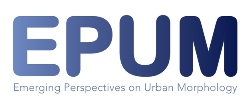EPUM is a transnational research project which aims at the integration of different, often isolated urban form research and teaching approaches through pedagogic innovation and Information and Communication Technology (ICT). It aims to develop an innovative, open and inclusive system of teaching and training in urban form from a multidisciplinary perspective, which is capable of enabling the current and future generation of planning and design professionals to address comprehensively and effectively the variety of issues and challenges faced by contemporary cities.
Contemporary cities are characterized by a variety of forms of socio-spatial patterns and increasing social, economic, and political fragmentation strongly related to their urban form. Urban municipal authorities, policy makers, urban designers and scholars are all called to respond to such challenges and a variety of approaches on understanding urban form, both theoretical and operational, has developed. However, these are characterized by specific national trends and have seen the emergence of separate schools of thought (what may be termed the ‘process typological approach’, the ‘historic geographical approach’, the ‘configurational approach’, and the ‘relational approach’). Each approach tends to be associated with a main research centre or with certain individual researchers and all have traditionally been applied in isolation.
The teaching of urban form analysis in higher education institutions across Europe is also addressing contemporary cities’ issues from often isolated perspectives based on the aforementioned different schools of thought, either reflecting specific national educational trends or opting for a globalized approach cutting the knots with local specificities. There is still a lack of learning spaces which foster a multidisciplinary thinking about contemporary cities’ issues and which enable the participation of all relevant stakeholders in the debate about contemporary cities’ problems and solutions.
There is an obvious need to establish a network linking the different approaches, developing learning platforms that foster the exchange of knowledge, providing opportunities for contact between members and encouraging the dissemination of findings both nationally and internationally.
This coming together of researchers, educators and learners from different language, geographical areas and disciplines will provide the basis for a multidisciplinary field and the opportunity to establish common theoretical foundations for the growing number of urban form studies in many parts of the world. It will provide the means to engage all stakeholders currently within introverted disciplinary, institutional and geographical boundaries, in a fruitful discussion through a collaborative open learning curriculum supported by a blended learning approach. Furthermore, the engagement of relevant stakeholders (learners, teachers, professionals, policy makers and local societies) with the project’s activities will establish a dedicated and sustained community around urban form research and pedagogy.
EPUM’s objectives to bridge across disciplinary, research and institutional boundaries aim to address real and timely issues concerning cities by providing an interactive blended learning environment. The field is multi-disciplinary and the subject as multi-faceted as the city. Multidisciplinary urban form studies, research and innovative pedagogy have the potential to contribute to the understanding and management of urban development in a period of unprecedented change.
Related documents:


